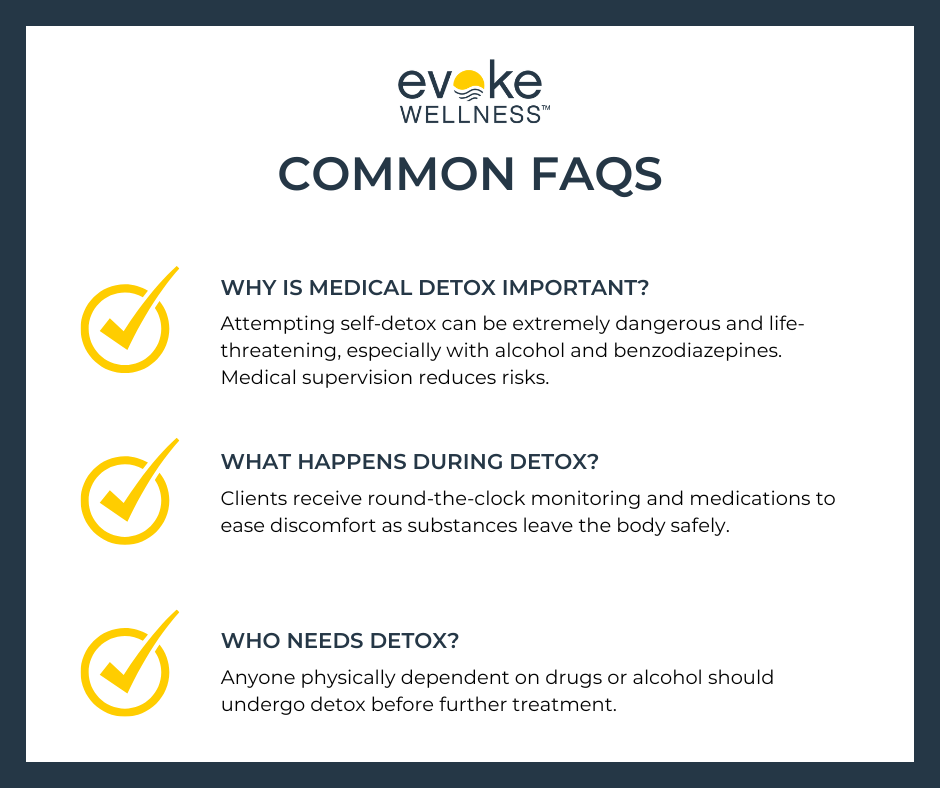As you consider taking the courageous step toward recovery, understanding the detox process is crucial. Medically supervised detox provides a safe, controlled environment to manage withdrawal symptoms and begin your journey to sobriety. Recent studies show that patients who undergo professional detox are 1.5 times more likely to complete substance abuse treatment programs. This comprehensive guide will walk you through what to expect during each phase of detox, whether you’re seeking help for drug and alcohol dependence, require medication-assisted treatment (MAT), or need dual diagnosis care for co-occurring mental health issues. By knowing what lies ahead, you can approach this vital first step with confidence and determination.
Together, let’s embrace the journey to recovery and the promise of a new beginning. Call us at (617) 917-3485 today or reach out online.
Understanding Medically Supervised Detoxification
The Critical Role of Medical Supervision
Attempting to detox from drugs or alcohol alone can be extremely dangerous and even life-threatening. Medically supervised detoxification provides a safe, controlled environment where trained professionals monitor your progress and manage withdrawal symptoms. This reduces the risk of severe complications and increases your chances of a successful, comfortable detox experience.
Customized Care for Effective Detox
Detox is not a one-size-fits-all process. Accredited rehab centers like Evoke Wellness carefully tailor their medical detox protocols to each individual’s unique circumstances. Factors like the substance(s) used, duration and severity of addiction, and any co-occurring mental health issues are considered to create a personalized treatment plan.
A Vital First Step in Comprehensive Treatment
While essential, medical detox is just the initial stage of a comprehensive addiction treatment program. After stabilizing the body and mind, individuals can seamlessly transition into evidence-based therapies, counseling, and continued support to address the psychological aspects of substance abuse and build a strong foundation for sustained recovery.
Minimizing Withdrawal Risks and Discomfort
Withdrawal symptoms from drugs or alcohol can range from uncomfortable to severe and potentially life-threatening. Medically supervised detox utilizes medications like benzodiazepines to ease cravings, anxiety, tremors, and other withdrawal effects as substances leave the system. This minimizes risks and helps make the detox process as safe and comfortable as possible.
Preparing for a Healthier Future
By choosing medically supervised detox at a reputable treatment center, you’re taking the crucial first step toward overcoming addiction and embracing a healthier, substance-free lifestyle. With 24/7 medical care and supervision, you can detox safely while having access to comprehensive support resources for long-term recovery.
The Stages of Detoxification
Initial Withdrawal Phase
The detoxification process begins with the initial withdrawal phase, which typically lasts 1-3 days. During this time, your body rids itself of the substance’s toxins, leading to uncomfortable physical and psychological symptoms. Common withdrawal effects include nausea, tremors, anxiety, insomnia, and intense cravings. This stage underscores the importance of medically supervised detox to ensure your safety and comfort.
Acute Withdrawal Stage
As withdrawal progresses into the acute stage (days 3-7), symptoms can intensify before gradually subsiding. This phase often involves mood swings, depression, body aches, and potential complications like seizures with alcohol or benzodiazepine withdrawal. Around-the-clock medical monitoring and medication management are crucial during this volatile period to minimize risks and ease discomfort.
Emotional and Psychological Healing
Even after the physical detox is complete, emotional and psychological healing continues for weeks or months in post-acute withdrawal. Lingering effects like anxiety, sleep disturbances, and drug cravings can persist, necessitating ongoing therapy and support. This stage highlights the importance of transitioning seamlessly into comprehensive addiction treatment after detox to achieve full recovery.
Navigating the stages of detoxification requires professional guidance in a licensed, accredited facility offering integrated treatment for addiction and co-occurring disorders. With proper medical supervision, you can safely manage withdrawal and lay the foundation for lasting sobriety.
The Role of Medication-Assisted Treatment (MAT)
Easing Withdrawal Symptoms
Medication-assisted treatment (MAT) plays a pivotal role in managing the challenging withdrawal symptoms often experienced during detox. MAT combines FDA-approved medications with counseling and behavioral therapies, providing a comprehensive approach to support recovery. Medications like methadone, buprenorphine (Suboxone), and naltrexone help alleviate physical cravings and psychological distress, making the detox process more manageable.
Integrated Approach
MAT is not a standalone solution but rather an integral part of a holistic treatment plan. Evoke Wellness at Cohasset incorporates MAT into their comprehensive addiction treatment programs, combining medication with counseling, therapy, and other evidence-based treatments. This integrated approach addresses the multifaceted nature of substance abuse disorders, increasing the chances of achieving lasting sobriety.
Proven Effectiveness
Numerous studies have demonstrated the effectiveness of MAT in improving treatment outcomes, decreasing the risk of relapse, and reducing the likelihood of overdose. According to the Substance Abuse and Mental Health Services Administration (SAMHSA), individuals receiving MAT are up to 75% more likely to remain in treatment compared to those without medication support. This increased treatment retention is a crucial factor in achieving long-term recovery.
Addressing Dual Diagnosis During Detox
The Dual Diagnosis Challenge
Substance abuse and mental health disorders often go hand-in-hand, creating a complex web of challenges known as a dual diagnosis. According to the study by Bain and Company, up to 50% of individuals with substance use disorders also have a co-occurring mental health condition. This intricate interplay demands an integrated approach during detox and throughout the recovery journey.
Comprehensive Evaluation
The path to healing begins with a thorough evaluation by clinical professionals to identify the specific substance use disorder and any underlying mental health issues. This comprehensive assessment lays the foundation for developing an individualized treatment plan that addresses both aspects of the dual diagnosis.
Integrated Treatment Approach
Effective dual diagnosis treatment combines evidence-based therapies, such as Cognitive-Behavioral Therapy (CBT) and Dialectical Behavior Therapy (DBT), with medication-assisted treatment (MAT) options like methadone, Suboxone, or Vivitrol. This multifaceted approach helps manage withdrawal symptoms, cravings, and mental health concerns simultaneously, increasing the chances of successful recovery.
Ongoing Support and Aftercare
While the initial detox phase may last a few days to a couple of weeks, the recovery journey is ongoing. Post-Acute Withdrawal Syndrome (PAWS) can persist for months, underscoring the importance of continued support through counseling, sober living arrangements, and alumni support groups. This holistic approach fosters lasting recovery and equips individuals with the tools to manage their dual diagnosis over the long term.
What to Expect During a Medically Supervised Detox
The Detox Process
During a medically supervised detox program, you’ll undergo the safe removal of drugs or alcohol from your body under 24/7 clinical care. This is a crucial first step in overcoming substance use disorders, as withdrawal symptoms can be severe and potentially life-threatening without proper medical management.
The detox process typically lasts 5-7 days, providing round-the-clock monitoring and interventions to ease your discomfort and stabilize your physical and mental state. Medications like benzodiazepines, buprenorphine, and methadone may be used to alleviate withdrawal symptoms and cravings.
Managing Withdrawal
As your body rids itself of addictive substances, you may experience a range of withdrawal symptoms. Common effects can include nausea, tremors, anxiety, insomnia, and in severe cases, seizures or delirium tremens.
The intensity and duration of withdrawal depend on factors like the specific substance(s) used, severity of addiction, and any co-occurring mental health disorders. Your medical team will closely monitor your condition and administer medications as needed to ensure a safe, comfortable detox experience.
Transition to Ongoing Treatment
Detox is just the beginning of your recovery journey. Once stabilized, you’ll transition into comprehensive addiction treatment programs to address the root causes of substance abuse through evidence-based therapies, counseling, and aftercare planning.
Many individuals require dual diagnosis treatment to simultaneously manage addiction and co-occurring mental health disorders like depression or PTSD. An integrated approach increases your chances of achieving long-term sobriety and wellness.
Preparing for a Successful Detox
Set the Stage
Preparing for a successful detox requires creating a supportive environment. This means removing any substances from your living space and informing loved ones of your plans. According to Stanford, involving family and friends can increase detox success rates by providing accountability and encouragement. Take steps to minimize triggers and temptations during this critical time.
Seek Professional Guidance
Consulting with addiction treatment professionals is vital for a safe, medically-supervised detox. They can evaluate your specific needs and recommend an appropriate program, whether for drug, alcohol, or dual diagnosis treatment. Experienced staff will monitor your progress and provide medications to ease withdrawal symptoms when necessary.
Develop an Aftercare Plan
Recovery doesn’t end with detox. Planning for ongoing support is crucial to prevent relapse and promote long-term sobriety. Work with your treatment team to develop a comprehensive aftercare plan, which may include therapy, support groups, sober living arrangements, or medication-assisted treatment. Having a clear path forward increases your chances of sustained success.
What to Expect When Detoxing: FAQs
Common Concerns and Questions
Entering detox can raise many questions and concerns about the process. Rest assured, medically supervised detox programs prioritize safety and comfort. According to this source, 24/7 clinical care monitors clients and manages withdrawal symptoms through medications like buprenorphine, methadone, benzodiazepines, and anticonvulsants.
Duration and Expectations
The detox timeline varies based on factors like the substance abused, severity, and co-occurring disorders. Typically:
- Alcohol detox: 3-7 days
- Opioid detox: 5-10 days
- Benzodiazepine detox: 10-14+ days
Peak withdrawal usually hits within 72 hours. While uncomfortable, medical staff closely monitor vitals and adjust medications as needed for a safer experience.
Many also inquire about next steps after detox. Comprehensive rehab through residential, outpatient, therapy, and sober living programs builds relapse prevention skills.
Conclusion
As you embark on your journey to recovery, a medically supervised detox program provides the safest and most effective path forward. By understanding the day-by-day process, you can approach detoxification with confidence and determination. Remember, detox is just the first step in addressing substance use disorders. Recent studies show that patients who transition from detox directly into comprehensive treatment programs have significantly higher rates of long-term sobriety. Whether you require drug and alcohol detox, medication-assisted treatment (MAT), or dual diagnosis care, professional support is crucial. Take the courageous step towards a healthier future by reaching out to a reputable treatment center today. Your new life awaits – free from the chains of addiction.
Begin Your Journey with Evoke Wellness at Cohasset
If you or a loved one is considering treatment, Evoke Wellness at Cohasset invites you to contact us. Our compassionate team is ready to answer your questions, discuss your needs, and help you take the first steps toward recovery. In Cohasset, you’ll find more than just a treatment program – you’ll discover a community dedicated to your wellness and success. Together, let’s embrace the journey to recovery and the promise of a new beginning. Call us at (617) 917-3485 today or reach out online.





